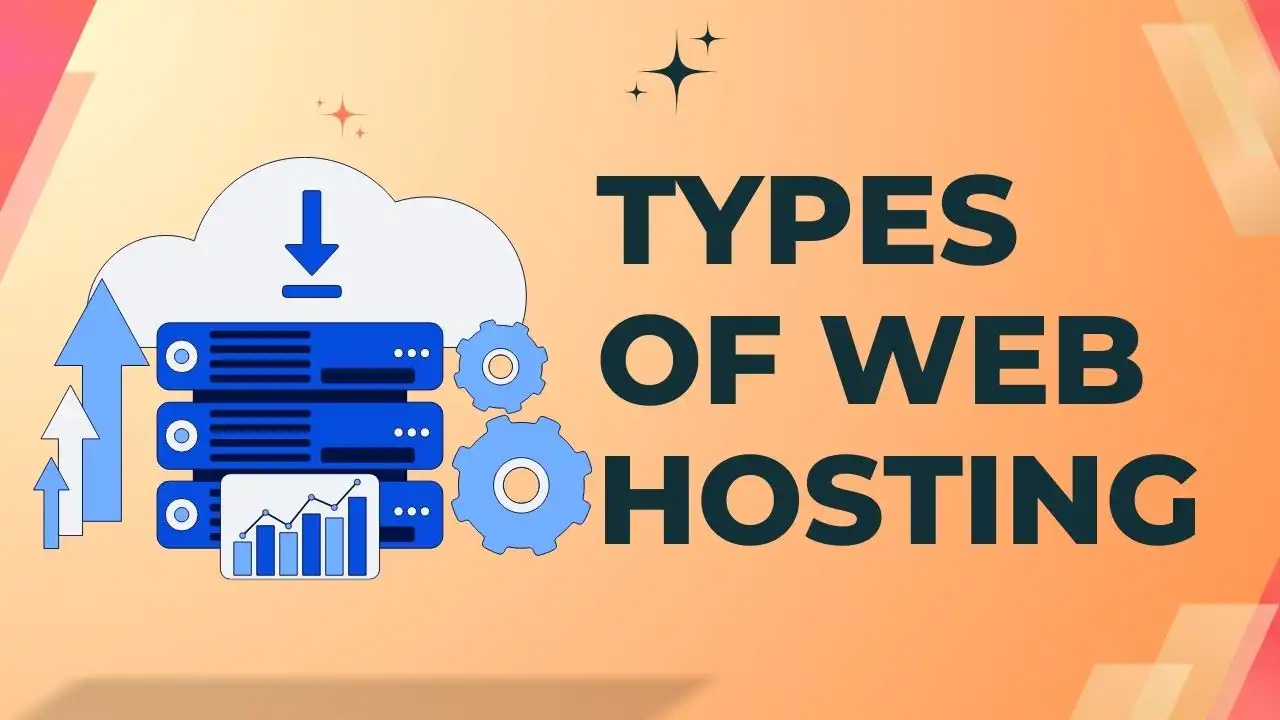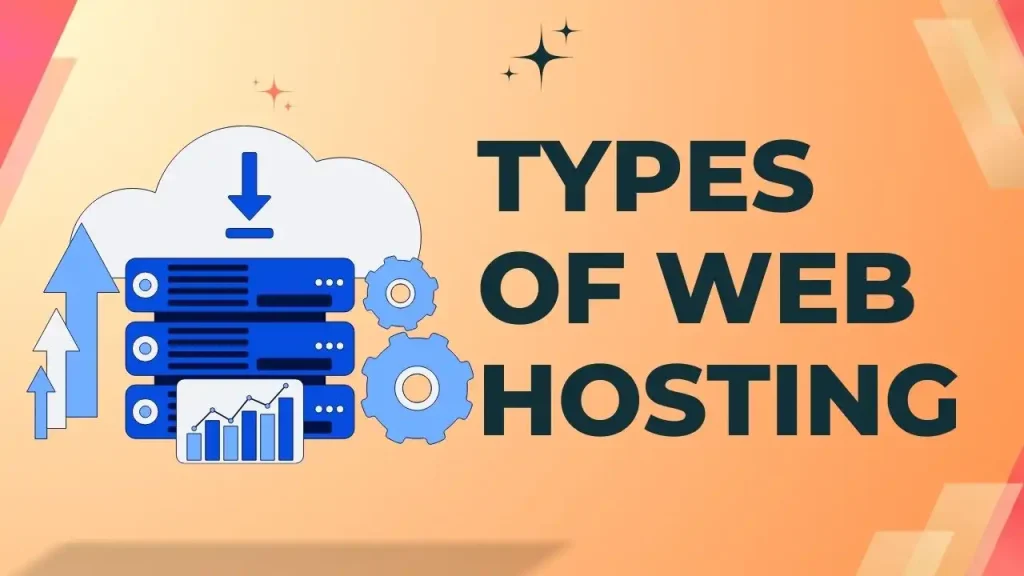
Types of Web Hosting Explained: Shared, VPS, Dedicated, and Cloud
Table of Contents
Choosing the right web hosting is one of the most important steps when creating a website. The hosting type you pick directly affects how fast your site loads, how secure it is, and how easily it can grow as your audience expands.
For individuals, small businesses, or large organizations, each hosting option offers different benefits and limitations.

At Digiwalebabu, we help businesses identify the hosting solution that fits their goals and budget. This guide dives into the four main types of hosting—Shared, VPS, Dedicated, and Cloud—explaining their unique features, advantages, drawbacks, and best scenarios for use, so you can choose the solution that keeps your website reliable, efficient, and future-ready.

What Is Web Hosting?
Web hosting is a service that allows individuals and businesses to make their websites accessible on the internet. A hosting provider stores your website’s files, databases, and applications on a server, ensuring that users can access them anytime via a domain name.

Without hosting, a website cannot go live. Choosing the right hosting plan determines your website’s speed, uptime, performance, and scalability.
Why Understanding Types of Web Hosting Matters
When building a website, choosing the right hosting is more than just a technical decision—it directly affects your website’s performance, growth, and visibility online.
Each hosting type—Shared, VPS, Dedicated, or Cloud—offers different advantages and limitations. By understanding them, you can select a solution that fits your business goals, avoids unnecessary costs, and ensures long-term success.
Key Reasons Why It Matters
- Performance – The hosting type directly impacts website speed and loading times. A poorly optimized plan can slow down your site, leading to a poor user experience and higher bounce rates.
- Scalability – Different hosting types handle traffic differently. For example, cloud hosting can scale easily during traffic spikes, while shared hosting may struggle under heavy loads.
- Security – The level of protection from cyber threats depends heavily on your hosting environment. Dedicated and VPS hosting usually provide stronger security compared to shared hosting.
- Cost-effectiveness – Choosing the right hosting ensures you don’t overpay for resources you don’t need while still getting enough power to run your site smoothly.
- SEO Impact – Search engines prefer websites that are fast, secure, and reliable. The right hosting helps improve rankings and boosts organic traffic.
Main Types of Web Hosting
When it comes to hosting your website, not all solutions are created equal. The type of hosting you choose affects speed, security, scalability, and overall user experience.

There are four primary types of web hosting that every website owner should understand before making a decision. Each has its own pros, cons, and best use cases depending on your goals and budget.

The Four Main Types of Web Hosting
- Shared Hosting – Multiple websites share the same server resources. It’s the most affordable option, perfect for beginners, blogs, and small business websites.
- VPS Hosting (Virtual Private Server) – A single physical server is divided into virtual servers, giving you more control and dedicated resources compared to shared hosting. Ideal for growing websites and medium-sized businesses.
- Dedicated Hosting – You get an entire physical server exclusively for your website. It offers maximum power, customization, and security, but comes at a higher cost. Best for enterprises and high-traffic websites.
- Cloud Hosting – Your website runs on multiple interconnected servers. It offers scalability, flexibility, and high uptime. Suitable for startups, SaaS platforms, and businesses with unpredictable traffic.
Each of these types of web hosting serves a different purpose, so selecting the right one depends on your website’s size, expected traffic, and technical needs.
1. Shared Hosting
Shared hosting is the most common and affordable type of web hosting, making it an excellent choice for beginners. In this setup, multiple websites share the same server and resources such as CPU, RAM, and bandwidth.

While this makes it cost-effective and easy to manage, it also comes with certain limitations in terms of performance, customization, and security. Shared hosting is best suited for small websites, personal blogs, and businesses that do not expect heavy traffic.
Key Features of Shared Hosting
Shared hosting is designed to make website management simple and affordable, especially for beginners and small businesses. Since multiple websites are hosted on a single server, resources like storage, CPU, and bandwidth are shared among all users.
This setup allows hosting providers to keep costs low while still offering essential features for running a website. Although performance and customization are limited, shared hosting remains one of the most popular choices for entry-level website owners.
Main Features of Shared Hosting
- Multiple websites on one server – Your website shares server space and resources with other sites.
- Easy setup, beginner-friendly – Most plans include one-click installations, control panels, and simple management tools.
- Limited server resources – CPU, RAM, and bandwidth are shared, which may affect performance during high traffic.
- Basic security and performance – Providers offer standard protection, but advanced security features are often limited.
Advantages and Disadvantages of Shared Hosting
| Aspect | Details |
| Advantages | |
| Cost-effective | Cheapest hosting option available, budget-friendly for beginners |
| Beginner-friendly | Easy to manage with cPanel or hosting dashboard |
| Low maintenance | Hosting provider handles server updates and technical management |
| Good for small sites | Ideal for blogs, portfolios, and small business websites |
| Disadvantages | |
| Performance issues | Websites may slow down if other sites consume excessive server resources |
| Limited customization | Cannot install advanced software or perform server-level modifications |
| Security risks | Shared environment increases vulnerability to hacking and cyberattacks |
Best Use Cases of Shared Hosting
Shared hosting is most suitable for individuals and businesses that don’t require high server power or advanced customization. Since it is affordable and easy to manage, it works well for beginners and small projects with limited traffic.
It allows website owners to establish an online presence without investing heavily in hosting infrastructure, making it a practical option for entry-level needs.
Best Situations to Use Shared Hosting
- Blogs and personal websites – Ideal for hobby bloggers, writers, or personal projects that don’t attract massive traffic.
- Small business websites – Perfect for local businesses that need an online presence without handling complex technical setups.
- Portfolio websites – Great for freelancers, designers, or photographers who want to showcase their work in a professional way.
- Websites with low or moderate traffic – Suitable for sites that get steady but not heavy traffic, ensuring cost-effectiveness without sacrificing availability.
Shared Hosting Overview (Tabular Format)
| Aspect | Details |
| Definition | Multiple websites share a single server and resources |
| Key Features | Beginner-friendly, shared resources, basic security |
| Advantages | Affordable, easy to manage, low maintenance, ideal for small websites |
| Disadvantages | Slower performance, limited customization, higher security risks |
| Best Use Cases | Blogs, small businesses, portfolios, low-traffic websites |
2. VPS Hosting (Virtual Private Server)
VPS hosting is the middle ground between shared and dedicated hosting, offering a balance of affordability and performance. It uses virtualization technology to divide a physical server into multiple private servers, ensuring that each website has its own dedicated resources such as CPU, RAM, and storage.

Unlike shared hosting, where resources are shared among many users, VPS provides more stability, flexibility, and security, making it suitable for growing businesses and websites that expect moderate to high traffic.
Key Features of VPS Hosting
- Virtual partition of a physical server – Each website is isolated in its own environment, ensuring stability.
- Dedicated resources – Guaranteed RAM, storage, and CPU are allocated to each VPS.
- Root access – Provides advanced control to configure the server and install custom software.
- Higher security – Stronger protection and isolation compared to shared hosting environments.
VPS Hosting Overview
| Aspect | Details |
| Advantages | Better performance – Guaranteed resources ensure faster load timesScalable – Easily upgrade resources as traffic growsCustomizable – Install custom applications and configure the serverAffordable alternative to dedicated hosting |
| Disadvantages | Higher cost – More expensive than shared hostingRequires technical knowledge – Root access means you may need server management skillsResource limitations – Still limited compared to a full dedicated server |
| Best Use Cases | Growing websites with medium trafficE-commerce stores requiring stable performanceWebsites handling sensitive dataBusinesses planning to scale |
3. Dedicated Hosting
Dedicated hosting provides an entire physical server exclusively for your website. Unlike shared or VPS hosting, you don’t share resources with anyone else. This type of web hosting is the most powerful but also the most expensive.
Key Features of Dedicated Hosting
Dedicated hosting gives you an entire physical server exclusively for your website, providing unmatched control, performance, and security. Unlike shared or VPS hosting, you don’t share resources with anyone else, making it ideal for high-traffic websites and businesses that require maximum reliability.
With dedicated hosting, you can configure hardware and software according to your specific needs, ensuring optimal performance and flexibility.
Main Features of Dedicated Hosting
- Complete control of the server – Full administrative access to configure settings and install software.
- Highest level of performance and security – No resource sharing, ensuring faster speeds and enhanced protection.
- Custom hardware and software configuration – Tailor the server environment to meet specific business or application needs.
- Ideal for high-traffic websites – Can handle large volumes of visitors without affecting website performance.
- Dedicated Hosting Overview
| Aspect | Details |
| Advantages | Maximum performance – No sharing of resourcesHigh security – Better protection from cyber threatsFull customization – Install and configure anything you needReliable uptime – Handles large volumes of traffic seamlessly |
| Disadvantages | Expensive – Costliest option among all hosting typesRequires expertise – Server management skills necessaryOverkill for small websites – Not suitable for beginners |
Best Use Cases of Dedicated Hosting
Dedicated hosting is designed for websites and applications that demand maximum performance, security, and control.
It is ideal for organizations with high traffic or complex technical requirements, where shared or VPS hosting would be insufficient.
By providing a full server exclusively for one website, dedicated hosting ensures reliability, stability, and the ability to customize the environment to specific business needs.
Typical Scenarios for Using Dedicated Hosting
- Large e-commerce websites – Handles high traffic, multiple transactions, and ensures fast load times.
- High-traffic blogs and portals – Supports thousands of visitors without affecting performance.
- Businesses needing enterprise-level hosting – Suitable for corporations that require robust infrastructure and advanced security.
- Applications requiring maximum security and customization – Perfect for financial, healthcare, or other sensitive applications that need strict compliance and tailored server configurations.
4. Cloud Hosting
Cloud hosting is a modern web hosting solution where websites are hosted on a network of virtual servers that draw resources from multiple physical servers. This architecture ensures high uptime, flexibility, and the ability to handle traffic spikes efficiently.
Unlike traditional hosting, cloud hosting allows resources to be scaled automatically based on demand, making it ideal for businesses that need performance, reliability, and global reach.
Key Features of Cloud Hosting
- Uses multiple interconnected servers – Ensures website availability even if one server fails.
- Pay-as-you-go pricing model – Only pay for the resources you actually use.
- Automatic scaling based on demand – Resources increase or decrease automatically according to traffic.
- High reliability and redundancy – Redundant servers prevent downtime and improve website stability.
Advantages of Cloud Hosting
- Scalability – Easily scale resources up or down based on website traffic.
- High uptime – Redundant server networks ensure minimal downtime.
- Flexible pricing – Pay only for what you use, making it cost-efficient.
- Global reach – Servers spread across multiple regions for faster access to global users.
Disadvantages of Cloud Hosting
- Complex setup – May be challenging for beginners to configure.
- Variable costs – Traffic spikes can lead to unpredictable bills.
- Shared environment – Some cloud hosting plans still share resources with other users.
Best Use Cases of Cloud Hosting
- Startups expecting rapid growth – Can handle sudden traffic surges without downtime.
- SaaS businesses – Provides scalable infrastructure for software-as-a-service platforms.
- Websites with unpredictable traffic – Automatically adapts resources to meet demand.
- Global businesses requiring performance across regions – Ensures fast loading times for international audiences.
Cloud Hosting Overview (Tabular Format)
| Aspect | Details |
| Key Features | Uses multiple interconnected serversPay-as-you-go pricing modelAutomatic scaling based on demandHigh reliability and redundancy |
| Advantages | Scalability – Easily scale resourcesHigh uptime – Redundant serversFlexible pricing – Pay only for what you useGlobal reach – Faster access across regions |
| Disadvantages | Complex setup – May be confusing for beginnersVariable costs – Unpredictable billsShared environment – Some resources still shared |
| Best Use Cases | Startups expecting rapid growthSaaS businessesWebsites with unpredictable trafficGlobal businesses needing performance across regions |
Comparison Table: Types of Web Hosting
Here’s a side-by-side comparison of the types of web hosting:
| Hosting Type | Performance | Cost | Scalability | Security | Best For |
| Shared Hosting | Low | Very Low | Limited | Basic | Beginners, small websites |
| VPS Hosting | Medium | Moderate | Good | Strong | Growing businesses, e-commerce |
| Dedicated Hosting | Very High | Expensive | Limited | Very Strong | Enterprises, large websites |
| Cloud Hosting | High | Flexible | Excellent | Strong | Startups, SaaS, global sites |
How to Choose the Right Type of Web Hosting
Choosing the right type of web hosting is a crucial decision that affects your website’s performance, security, and growth potential. With options like Shared, VPS, Dedicated, and Cloud hosting, selecting the best plan depends on your website’s size, traffic, technical expertise, and budget.
Understanding your priorities ensures you pick a hosting solution that meets your current needs while allowing room for future growth.
Key Considerations When Choosing Web Hosting
- Budget – If you are just starting, shared hosting is a cost-effective option. As your website grows, you can upgrade to VPS, dedicated, or cloud hosting.
- Traffic Needs – High-traffic websites require more robust hosting solutions like VPS, dedicated, or cloud hosting to maintain performance and speed.
- Technical Expertise – If you lack server management skills, consider managed hosting options that handle updates, security, and configurations for you.
- Scalability – Websites expecting rapid growth should opt for cloud hosting, which allows resources to scale automatically based on demand.
- Security – For sensitive data, such as financial or healthcare information, VPS or dedicated hosting with advanced security features is the best choice.
People Also Ask About Types of Web Hosting
What is the difference between Shared, VPS, Dedicated, and Cloud hosting?
Shared hosting shares server resources, VPS provides dedicated virtual resources, Dedicated gives an entire server to one website, and Cloud hosting uses multiple servers for scalability and reliability.
Which type of hosting is best for beginners?
Shared hosting is ideal for beginners due to its affordability, ease of setup, and basic maintenance provided by the host.
Can I upgrade my hosting plan later?
Yes. Most hosting providers allow you to start with Shared or VPS hosting and upgrade to VPS, Dedicated, or Cloud hosting as your website grows.
Is VPS hosting suitable for e-commerce websites?
Yes. VPS hosting provides dedicated resources and better security, making it suitable for small to medium e-commerce stores.
Why is Dedicated Hosting more expensive than other types?
Dedicated hosting offers an entire physical server exclusively for your website, providing maximum performance, security, and customization, which increases the cost.
What makes Cloud Hosting different from traditional hosting?
Cloud hosting uses multiple interconnected servers, offering automatic scaling, high uptime, and the ability to pay only for the resources you use.
Do I need technical knowledge to manage VPS or Dedicated Hosting?
Yes, especially for Dedicated hosting. VPS may require some technical knowledge if you choose an unmanaged plan, but managed options are available.
Which hosting type is best for high-traffic websites?
Dedicated and Cloud hosting are ideal for high-traffic websites due to their performance, scalability, and reliability.
How does hosting affect SEO and website performance?
Faster, secure, and reliable hosting improves website load times and uptime, which positively impacts SEO rankings and user experience.
Can I host multiple websites on the same hosting plan?
Yes. VPS, Dedicated, and Cloud hosting typically allow multiple websites, while some Shared hosting plans may also support a limited number of sites.
Conclusion
Choosing the right type of web hosting is a vital step in building a successful website. The decision affects your site’s performance, security, scalability, and overall user experience.
Shared Hosting is perfect for beginners and small projects, offering affordability and ease of use.VPS Hosting provides a balance of control, performance, and cost for growing websites.
Dedicated Hosting delivers maximum power, customization, and security for enterprises and high-traffic sites. Cloud Hosting offers unmatched scalability, reliability, and flexibility for websites expecting rapid growth or global reach.
At Digiwalebabu, we recommend starting with a hosting plan that fits your current needs and scaling as your business grows.
The right hosting ensures your website remains fast, secure, and accessible, supporting both immediate goals and long-term success.
